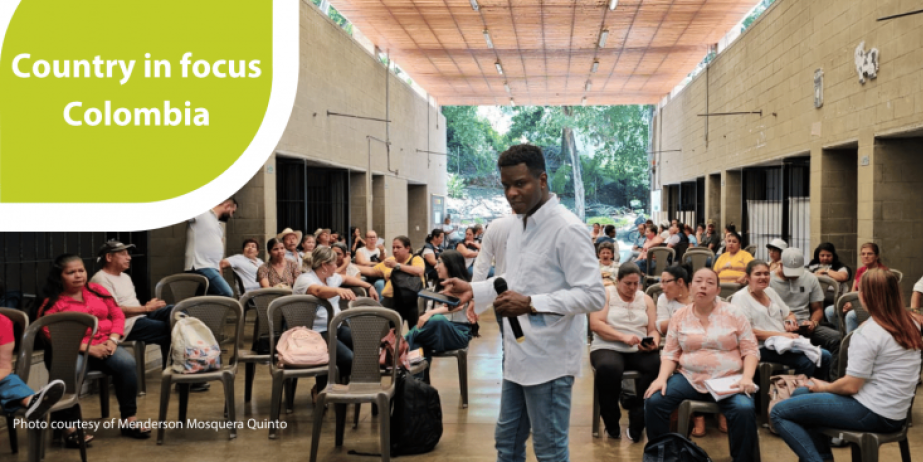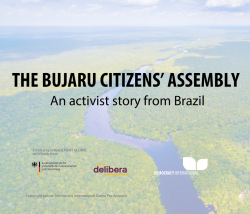In Country in Focus, Democracy International takes a closer look at advances in modern direct democracy and citizen participation worldwide. This article is dedicated to Colombia and supports the webinar series ‘Life as an activist’. You can watch the webinars here.
Mauricio Jaramillo Jassir is an associate professor at the University of Rosario in Bogotá.
What is Colombia's political culture like?
I have to say that for more than half of the last century, Colombia has had an internal conflict that has conditioned our political culture. This is the first element to take into account.
Secondly, recently there has been a lot of scepticism about politics. People are used to voting, but they do not have high expectations of politicians. We have seen a lot of problems with corruption, the influence of the paramilitaries in recent years and the lack of effectiveness of the last government. There is a kind of disenchantment with democracy and a lack of support for democracy.
Talking about the current political situation, I need to mention that in the last regional elections, there was a 60% turnout. That's incredibly good news. We also have no significant incidents of violence, which is crucial in Colombia, especially during regional elections. We used to get used to seeing a city where people could not vote in the municipal elections because of violence.
Additionally, in the recent past peace has been very important in Colombia's political culture. The left and the right are divided in their ideas about peace. The right believes that peace requires authority and that the state must be strong. The left, on the other hand, defends the idea that peace must be negotiated, and that violence is the product of social contradictions, hunger and the concentration of resources.
I also think that the political balance is working well at the moment. We have a left-wing national government, but most of the municipalities are from the opposition. People are showing that they are independent and very aware of their duty to vote.
Also watch our webinar dedicated to Colombia and Latin America "Peacebuilding through direct democracy and activists in political office":
With a long history of armed violence, how has it changed participation, politics and voting patterns?
Firstly, in the 90s, the paramilitaries were very influential in certain regions, especially in the south of Colombia. They forced people to vote for certain candidates. So in that sense, there was no free electoral process because of the violence.
Secondly, I think that we did not have left-wing parties because of the violence. In the 80s, the left-wing political leaders were assassinated. So, in Colombia in the 80s and 90s, left parties had difficulties just to survive. We had a Patriotic Union, a left-wing party created in the 80s, that was pretty much eliminated in that period, and that is just an example of the left being in a very disadvantageous position in the political system.
Because of the stigmatisation of being associated with the guerrillas, it was very difficult for left-wing parties to stand in elections or to present a presidential candidate. This is still the case, as left-wing politicians are often accused of having guerrilla sympathies.
Finally, as I said, violence is very important in the way left and right organise their ideas. Violence is the main flashpoint of political ideas and political life here in Colombia.
In 2016, Colombians voted to ratify the peace agreement between the government and the FARC. The vote failed, but the peace agreement was still implemented. What were the main reasons for the failure of the 2016 peace vote?
2016 was a very bizarre year because of Brexit, the Trump election and also the peace referendum. I mentioned the first two because it shows that it was a year of the rise of fake news. Here in Colombia, we saw a very high level of manipulation from the right. They put out a lot of fake news, for example, about what would happen if the peace was implemented. They claimed that the guerrillas would become generals in the state army, that the country would follow the way of Venezuela and so on. There was certainly an information war, which the right easily won.
It is important to understand this historical moment in order to understand the reasons for the failure of the referendum. 2016 was one of the most important years in recent times of fake news, manipulation and social media, and the right was very intelligent in using these tools.
In general, the discussion about direct democracy in peacebuilding is ongoing, so what can you say about the Colombian experience and the potential of these tools in peacebuilding?
I think it is the ideal! If you want peace to be legitimate, you have to ask the people. Then you can fight against fake news, misinformation and social media, the information war, which is also happening now. I believe that the only way to end the cycle of violence and peace in a meaningful way is through a referendum. In my opinion, this was Juan Santos' duty, and he tried.
But it was a difficult battle to win because the president had to convince Colombians that the peace process was good, he had to explain point by point the importance and the implications of this agreement. These are all very complex ideas that require a lot of explanation. At the same time, the right won with very simple ideas, so in a way, it was a very unfair competition. But that does not mean that the tools of direct democracy should not be used.
What are the existing instruments of direct democracy in Colombia and their usage by the people?
Since 1991 we have had a constitution that has strengthened the idea of direct and participatory democracy. For example, the 1991 Constitution provides for the right to recall. There is also the possibility of citizens' initiatives, with the requirement to collect the signatures of a certain number of voters, proportional to the turnout at the last election.
Another important development is that Colombia recently approved the Escazú Agreement, a United Nations-supported agreement on access to information, public participation and justice in environmental matters in Latin America and the Caribbean. The agreement includes community consultations on infrastructure projects that could have a negative impact on the community, for example on the environment.
Overall, I think we have a lot of instruments and spaces for political participation.
In terms of using the instrument, I think we have a lot of will to participate, but not everyone knows that these instruments exist. Because of the signature and quorum restrictions, it is not easy to make these instruments popular.
Finally, we have to bear in mind that the 1991 Constitution has only been in existence for 30 years. In such a short period of time, it is quite complicated to get the instruments of direct democracy to work perfectly. It takes time for people to internalise the values, principles and mechanisms of direct democracy, and this is not always easy.
Colombia is one of the most dependent on fossil fuels countries, and the president has declared his intention to wean the country off them. At the same time, the Yasuni referendum in Ecuador was a success this year. What would you say about the prospects of using direct democracy to resolve extractivist disputes in Colombia?
The 1991 constitution includes the idea of popular consultations, and in some small towns in Colombia, they have managed to ban the exploration of gas and oil.
However according to Colombian law, the regulations of the energy industry take precedence over the consultations, which means that the consultations can propose an issue, but the final decision lies with the government. It exists as a mechanism for dialogue, but not as a final decision-making tool for citizens.
Another thing is that at the moment Colombia's priorities, as well as those of most countries in Latin America, lay not in the field of energy transition. There are very few cases of countries that have been willing to give up exploration. For example, in the first months of Gustavo Petro's government, he tried to promote the idea of an energy transition. It was totally rejected by the establishment.
Overall, I think it's very unlikely that there will be such a transition in Colombia in the short to medium term.
What are your visions for the democratic development of your country?
It's very important to trust people because the core of democracy is people. It is natural that people can make some mistakes and that is a risk of being a democrat.
Another problem at the moment is that people do not trust democracy. For example, technocracy rejects the people, it is believed that the only way to achieve development is to rely on experts and their views. I think we have to find a balance between expertise and people's opinions. We have to trust the people, otherwise we undermine democracy.
How do you think it is possible to encourage people to trust democratic institutions in a democratic process?
I think you have to encourage dialogue. At the moment there are a lot of non-democratic political movements or candidates who are very popular. This is a lack of effectiveness that is eroding democracy. The erosion of democracy is the most important thing in these times of polarisation, and we have to show people that discussion is necessary. Even if we don't agree on everything all the time, we have to be able to confront what we have and talk about it.
This is the time when Victor Orban in Hungary, the Kaczynski brothers in Poland and Jair Bolsonaro in Colombia are very popular. I am very afraid of the power of political incorrection. And I think the best way to fight it is to promote dialogue and agree to disagree.
This article was written in connection with the Life as an activist project. Five countries, five democracy activists, five mini-documentaries! The following video is the Life as an activist project documentary.
Mini Documentary - Menderson Mosquera Quinto explains the realities and challenges of democracy activism in Colombia

